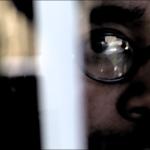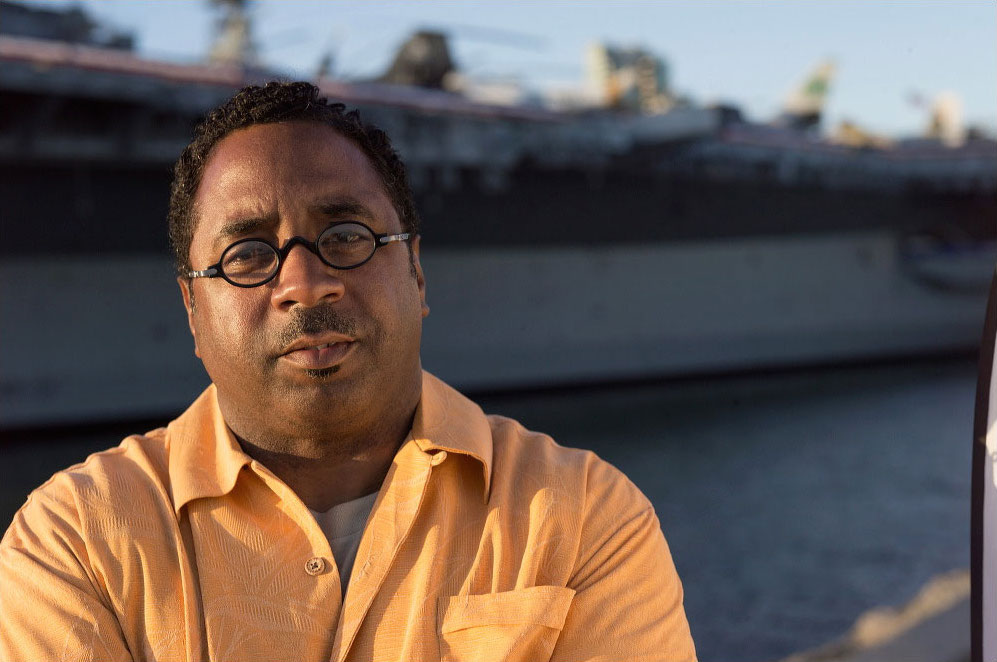A Safe Place
Veteran Frederick Gantt’s experience with PE

SFC Frederick M. Gantt
US Army US Navy, 1988-2014
Now I see the world as a safe place. Society has its ills and there's no utopia. But I'm in a safe place.”
Fred Gantt, a native of Brooklyn, New York, spent 24 years in the military, with the Navy in Desert Shield/Desert Storm and then with the Army in Operation Iraqi Freedom.
During his tour in Iraq he served as a Corpsman in a Marine ambulance unit. Gantt worked to triage and stabilize wounded soldiers, and then to transport them to the next echelon of care. He frequently found himself in live-fire situations and saw a great deal of bloodshed. One incident had an especially powerful effect on him.
Gantt had formed a strong bond with the unit's young driver. "He reminded me of my own son," he says. On a particularly tough mission, the unit's ambulance came under heavy fire from rocket propelled grenades. As the young driver shielded a wounded soldier with his body, he absorbed the force of a nearby explosion and was killed. "The anger that came after the insurgents fired that rocket … it was highly, highly felt."
After so many encounters with insurgents and the traumatic loss of his comrade, Gantt grew distrustful of anyone outside his unit. He was so wary that once he pulled a weapon on an elderly woman. He knew something was wrong. "I wasn't brought up to be like this. She could have been my mother."
At home, Gantt's problems continued. He was angry. His relationships with his family were strained. He had a hard time holding a job. He rarely went out in public. Most of all, he avoided thinking about his experiences as much as possible.
With his life spiraling downward, Gantt reached out to the San Diego VA Medical Center. There he was evaluated and diagnosed with PTSD, and he began to explore the treatment options. One of the therapies that was offered to him was called Prolonged Exposure, or PE. In PE he would be asked to confront the memory of his trauma head on.
I had to make a decision, which one do you want to live with? Taking a chance on this PE and this treatment and the medication, or continue hiding?"
Frederick Gantt
Gantt had pushed the traumatic events he'd experienced into what he called "a locked closet." He hoped they would stay hidden, locked away and unable to harm him. But his experiences were affecting him in ways he didn't fully understand. They had changed him. Perhaps most importantly, they were damaging his relationship with his family.

I acted out in ways that were not healthy. Even to this day my middle daughter...I have three children, and my middle daughter has no relationship with me. It was a lot that went on.”
After a great deal of soul searching and with the support of his wife and his pastor, Gantt decided to begin PE. He'd have to open his locked closet of traumatic memories, and he'd have to trust his therapists. But some of the VA therapists were civilians and for Gantt, trusting a civilian with his most painful wartime memories would be extremely difficult.
Coming to the VA to get help was a bit difficult because people who never put on a uniform were treating me. This was my mindset: What could you tell me that could help me, when you've never put on a uniform, never picked up a M16?"
Frederick Gantt
Gantt steeled himself for the hard work ahead. As painful as it might be, talking about the trauma with his therapist would open the door to the healing process. In therapy trauma survivors close their eyes and describe the traumatic event in detail, as if they were living through it again. Later they listen to recordings of the session over and over in the privacy of their own homes.
Gantt knew that telling his story would be hard, but he was unprepared for the intensity of the experience.
Going through the trauma for the first time was — I'll just use the word tough, but it's much, much more than that. It was very hard because I could see it in color. In my mind, I could almost smell the sulfur, I could smell the smoke."
Frederick Gantt
Once he felt even a slight change in his level of distress, Gantt could see he was on the right track.
Like many patients who undergo Prolonged Exposure, Gantt found that the more he retold and listened to his own story, the more the trauma memory loosened its grip. He began to feel more at ease than he had in years. He found it easier to talk to his wife.
Another component of PE is called "in vivo exposure." For the in vivo, a trauma survivor makes a list of those places and situations he most desperately wants to avoid. Then he picks one, goes there, and remains until his distress level drops.
Gantt found it painful to be in crowds; he couldn't drive under bridges; loud noises could set off a panic attack, and most challenging of all, he found it impossible to be around Middle Eastern people. So he chose to spend time in a Middle Eastern restaurant.
Could he take the tools he had learned in his therapist's office and apply them to the world outside?
I can actually listen to the news and not feel my level so high because of what I was hearing about in the Middle East.”
Frederick Gantt
Twelve weeks after beginning PE, Gantt had grown dramatically more comfortable in the world, feeling safe and at home. He realized that it was the memories of the trauma — the ones he tried to lock away — that were, in truth, holding him prisoner.
With this understanding he could take control of his life.
Today, Gantt continues to practice his "in vivos" on his own. Doing so reminds him of his progress, and provides real, everyday evidence of how far he's come and how much better he's feeling.
I'm in a safe place. The process of PE and going through it was painful. But it was worth it because I don't feel that anymore. I don't get sweaty palms going to a fireworks display, and I see the world as a safe place."
Frederick Gantt
In addition to his pursuit of a Master of Divinity, Gantt continues on his path of helping others. He serves as a Peer Support Specialist in the Mental Health clinic at VA San Diego, working with other Veterans who have been through trauma, offering his experience and support as they go through their own course of therapy.
Gantt attributes much of his success to his completion of Prolonged Exposure. He is now able to focus on the present, not the past.

Part of me was still in Iraq, still on the field, and still angry at people that didn't do anything to me. I would say when this got in its perspective, I came home. It feels good to be home."

Want to learn more about PE?
Check out these videos featuring VA providers and Veterans who’ve been through it.